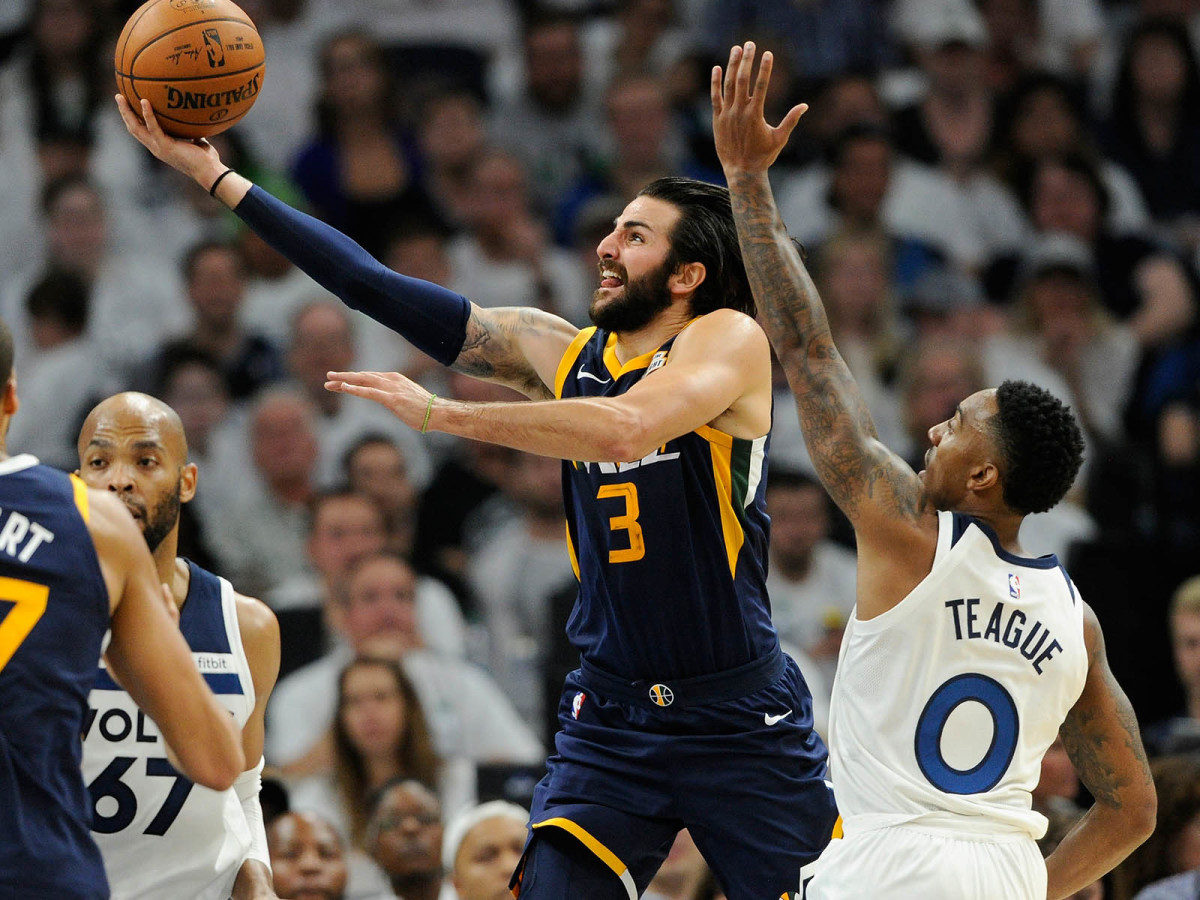Ricky Rubio, Donovan Mitchell, and the Second Life of the Jazz

You should watch more Utah Jazz games. I know this sounds crazy, and I'm not here to sell anyone on the intricacies of Quin Snyder's defensive schemes, surprising point differentials, or the underappreciated excellence of Rodney Hood. Those were the Utah conversations we had for the past few years, and nobody needs more of them. I promise this is not a case for the Jazz as workmanlike champions of The Little Things. This is a case for the Jazz as League Pass Elite. They are fun, weird, and good.
Granted, this could be a trap. On Wednesday night I watched Utah close out the Blazers with Ricky Rubio and Donovan Mitchell delivering knockout blows. It was as great as it sounds, but it also left me suspicious for at least a minute. Because if you were setting a trap for basketball hipsters to stupidly fall in love, does it get more than tempting a grizzled, bearded reboot of Ricky Rubio and a still-pretty-anonymous, mostly unproven Summer League superstar?
I wondered about that question after Mitchell opened overtime with a step-back three. But then Rubio scored 11 of the final 12 points in overtime, the Jazz pulled away, and I forgot to care about sample sizes. None of this seems real or sustainable—Rubio dropped 30 on Wednesday!—but that's what makes it great. If this is a trap, everyone should fall for it until further notice.
Back on opening night, it looked like the Jazz didn't have enough to hang with the Nuggets. Denver's offense had opened the game hitting everything, Will Barton had 21 points in the first half, and Utah was down 10 late in the third quarter. This is sort of how the season was supposed to go.
Gordon Hayward choosing Boston was a worst–case scenario for Utah, and it happened just as the rest of the West contenders doubled down with superstars. Coming into this year, everyone knew the the Jazz would play hard and Rudy Gobert would be dominant enough to help Quin Snyder maintain one of the league's best defenses. But Utah was answering Melo and Paul George trades with a Joe Ingles re-signing and a trade for Rubio, a player the Wolves gave away because it was time to start winning in the West.

But by the fourth quarter against the Nuggets, the Jazz came alive. Their offense showed up just as their defense rendered Denver helpless. The Nuggets scored 13 points in the fourth, while Alec Burks—heretofore a myth known only by injury reports—got rolling and helped turned a 10-point deficit into a 10-point win. However the season was supposed to go, that Nuggets game is how it's actually gone so far. Utah is good enough to defensively to stay close with anyone, and then there's a rotating cast of scorers who can go off to give them a chance at the end.
There are three players in Utah that anyone can love. Rudy Gobert is the first. He's the classic case of someone who's wildly underrated by mainstream audiences and probably a little overrated by the NBA internet. But watch him play and you understand where the hyperbole comes from. He might be the most entertaining defensive player in the league; he's quicker than he has any right to be and he covers so much ground at 7'3". He can ruin anyone who gets within eight feet of the rim. His offense has improved, yes, and health has been key over the past two years. But his defense is the show.
Speaking of entertainment: Donovan Mitchell.
Mitchell's athleticism was always his signature trait, and at least once or twice in every game, he'll show you why. But it's everything else that's caught people off guard through Summer League and the first month of the season. His jumper is still streaky (35% from the field, 31% from three), but when it's falling, you get a sense of how good he could be once his game becomes more refined. He dominated against the Lakers and Lonzo Ball (22 points, 9–16 shooting), and against the Blazers (28 points, 9–21 shooting) he was every bit as explosive as C.J. McCollum or Damian Lillard. Beyond numbers and dunks, he's displaying a feel for the game—passing, running pick-and-rolls, changing speeds—that's rare among rookies. It's a really good sign. As he becomes more dependable, his explosion can add a dimension to Utah's offense that the Jazz haven't had since Deron Williams's prime.
And Rubio. It's hard to know exactly how real this is, but he's currently putting up career highs in shooting percentage (47%), three-point percentages (44%), and scoring (17.5 PPG). Injuries have left his game a little wobblier than it once was, but he's no less crafty. There are flat-footed set shots hiding behind Gobert, spot-up threes, lay-ups falling out of bounds as he dives to the rim—it's all been so effective that it feels like watching a different player.
I interviewed Rubio last winter, and at one point he said, "I gotta be more aggressive. It's just something, 'Should I run the team or should I score?' I gotta learn how to balance that and be more aggressive sometimes." That's what's happening in Utah, in part because that's what the Jazz need. Everyone who cares about basketball spent years watching Rubio and wondering whether he'd ever become the player we imagined when grainy highlights made him an internet urban legend at 14 years old. The Minnesota years were rough. They were filled with hope undermined by eventual letdowns, and it was never clear how much blame belonged to Rubio or the team that was trying to build around him. Now he can just play.
Rubio's new team is in a similar spot. The Jazz lost Hayward, and now there are no more conversations about whether they have what it takes to make the conference finals. And in a weird way, that's what makes this team easier to love. We don't have to pretend that Hayward will ever be good enough to challenge the Warriors, or wonder how they keep him, or how they build. While the rest of the conference has loaded up with stars and is burdened with questions about whether they have enough, all that matters in Utah is that Donovan Mitchell is dunking on people. Also, Rubio is a shoot-first point guard now. Gobert is striking fear into the heart of Paul George. Joe Ingles is cracking jokes about not shooting enough, and still not shooting enough. We have proof of life on Alec Burks, Rodney Hood is still underrated, and Joe Johnson is never retiring.
Watch the Jazz this season. Their worst–case scenario offseason might have given us one of the most enjoyable teams in the league.
